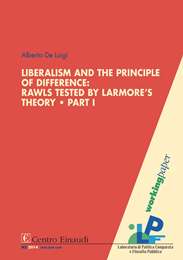- Ricerche e Progetti
- Biblioteca della Libertà
- Pubblicazioni e Working Paper
- Articoli e media
- Eventi e notizie
2014
Liberalism and the Principle of Difference: Rawls Tested by Larmore's Theory. Part I
WP-LPF 2/14
- Categoria/Category
- WP-LPF 2014
- Autore/Author
- Alberto De Luigi
- Editore/Publisher
- Centro Einaudi
- Luogo/City
- Torino
- Articolo completo/Full text
- WP-LPF_2_2014_De Luigi.pdf
Abstract
John Rawls’ Political Liberalism (1993) is considered a turning point in the theory of the famous author, but certain elements of his theory, as they were presented in his previous work A Theory of Justice (1971), might appear unclear under a liberal perspective, in particular with regard to the interpretation of the highly debated principle of difference. In the first part of this paper, it would be exposed the theory of political liberalism, with particular attention to the concept of neutrality as formulated by Charles Larmore; this precedes the analysis of the principles of justice in Rawls’ philosophy: an important aim of this work is to offer a key to understand the revision of Theory, which can be found reading Charles Larmore’s Patterns of Moral Complexity (1987), a book also studied and commented by Rawls. Starting from the common elements which bind the two said authors, it would be explained why Rawls borrows a lot from the theory of the younger philosopher, even underlining the references they make to each other’s works. The whole second part—published in this WP-LPF Series—would focus on this thesis: how the principle of difference, as proposed by Rawls in A Theory of Justice, could conform itself to the features of political liberalism theory.







